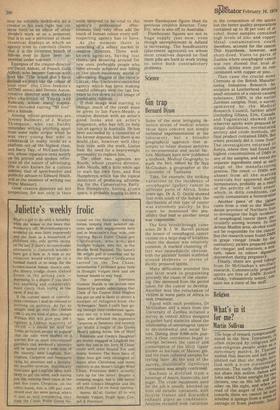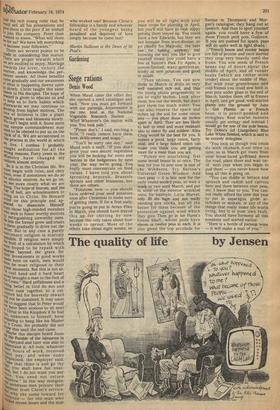Religion
What's in it for me?
Martin Sullivan
Tlie hope of reward, conspicuouslY noted in the New Testament, Id
us s often rejected by religio On non-religious people alike as ; mercenary motive. St Theres' blotted out that she might Were wished that heaven and hell
101 God .with a more disinterest,e.A emotion. The early disciples 01",, not share this notion. James and John asked Christ outright for tW° as e thrones, one on His left and the other on His right, and whe° 8w,5 read of the anger of the othe'e towards them we cannot be stlrf whether it springs from a senssus e 0,, outrage or from jealousy, Je
told the rich young ruler that he must sell all his possessions and give them to the poor if he wished to join His company. Peter then Wanted to know, "What will there De for us? We have left everything to become your followers."
There are several points to be Made in considering this matter. There are proper rewards which We are entitled to enjoy. Marriage rewards the lover, victory the Warrior, and knowledge the persistent seeker. All these benefits Conte gradually and our awareness °I what is happening dawns upon ?S slowly. Christ taught this same 'esson to His disciples. The hope of reward is given to educate us and to help us to form habits which afterwards we may continue to evelop from higher motives. The °ye of holiness is like a plant viT'llich grows and blossoms slowly. e can't begin with it. Some stern 4nd simple commandment may 11,_eed to be obeyed to put us on the ,Lr,,ack of it. We are accustomed to gas process in the world in which ‘ve live. I confess I probably Ought ordination for all the ong reasons. Forty years in the ministry have changed my °tItlook almost entirely. So it is in the Christian life. We FrIlLust begin with rules, and obey F'eni, even if sometimes we do so °r ulterior motives. As we go on, riWe see more clearly what we are `f?ing. The hope of heaven, and the h'ar of hell, are schoolmasters to 1,,ing US to CErist. He Himself "ed on this principle and apir7red to dissociate Himself Tri those high-minded moralists 00 seek to foster worthy motives kY extinguishing unworthy ones. t'e lets the former grow and trusts ,0 them gradually to drive out the latter. But in any case a purely tilercenary religion is scarcely
sible. If religion were simply Ze fruit of a calculation by which
hoped to be repaid with :1,erest beyond the grave for eleir investments in good works tkatle here on earth, men would \cell be most religious in their , orst moments. But this is not so. '4 Cool head and a hard heart
thttever brought a man to the foot of
e L,, ross.' Hard selfishness and a ,1„,.111g belief in God do not and exist together, so a calwp'!lated bid for heavenly reward oc;,411 not be sustained. It may seem to suggest that St Peter would t,,°t have been anxious to sit next Christ in His Kingdom if he had 44, unknown to himself, been i:Paring to hang like his Master CT1 a Cross. He probably did not N' this until the end came. tePi4aybe this disciple heard Jesus the the Parable of the labourers in Vineyard and later was able to t4m,erstand it. All men, whatever 07,11' hours of work, received cCal pay, and when some Plained, the employer said, weax,Ite that thine is and go thy the.Y: You shall have fair treatrilorit, but I do not want you any to re. You need not return kor,111°rr0w." In this way energetic tlis2rnbitious men procure their tiugussal from Christ's service. iv,,I'vlly the same reward for WiorL'Ynne — for the man who ".ed eleven hours and the man who worked one? Because Christ's fellowship is a family and whoever ,heard of the youngest being penalised and deprived of love simply because he came last?
Martin Sullivan is the Dean of St



































 Previous page
Previous page